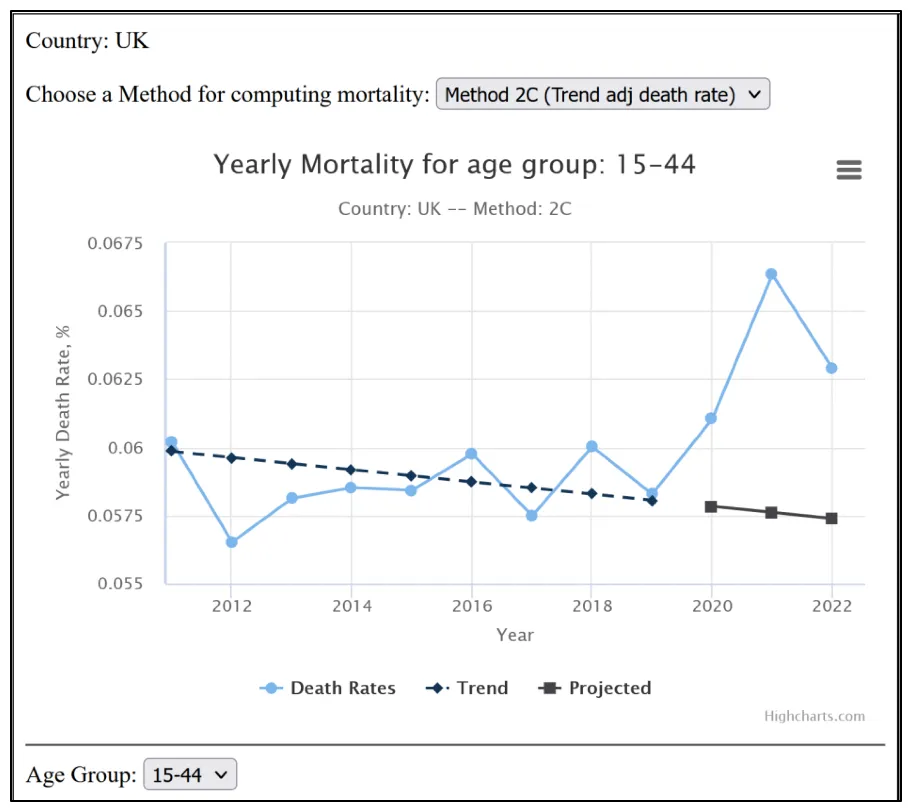… compelling evidence of causation… autoimmune-like inflammation and organ damage… common blood clotting-related adverse events… such as strokes, heart attacks and lung embolisms…

The question that now remains is to quantify the extent of the damage so far. Although there is increased recognition of the more immediate damage (such as myocarditis), we have serious concerns about the ongoing excess mortality we are observing, and morbidity trends in the longer term, such as neurological disorders, cancers and auto-immune disorders. For this reason, we decided to launch the V-damage project to measure and monitor this phenomenon… The majority of individuals and their institutions will have strong resistance to a “mea culpa” moment, and this brings us first to the dilemma of the vaccinated.
… vaccinated individuals (the majority of the population!) will be confronted with a dilemma: Either they A) face reality and go through the phases of grief associated with such realisations or; B) try to ignore reality and hope for the best. Let’s expand on the two options of the dilemma:
Option A.
This is the “oh my god” option. Individuals who take this path will eventually come to regret having been vaccinated. Most of them will likely be lucky and only have minor effects (or none) from the vaccine, but they may have friends and family with health problems that have been caused or exacerbated by the vaccines, and they realise that they will have to pay more taxes due to increased disabilities at a societal level.
However, with this acceptance comes the hope of ameliorating this problem. More voices speaking out will lead to better funding and less censorship of the doctors and scientists who are trying to research the vaccine damage and develop treatments to mitigate it.
Option B.
This is the “see no evil, hear no evil” option. It is the status quo, the comfort zone for most vaccinated individuals. They prefer to forget that they took the shot. Like the rest of the pandemic, for them it is in the past. They felt well at the time, so they see no reason to regret their decision now.
However, if the majority take this option, the scientists continue to be underfunded in researching the long-term impacts of the vaccines, and if the day comes when a loved one develops an unexpected condition, the medical establishment will be confounded. The doctors will be treating the symptoms without understanding the real cause, and perhaps use treatments that are ineffective. But what will the Option B individuals think of these unusual conditions and the difficulty in treating them? No-one knows, life sometimes throws us lemons!
At Phinance Technologies, we decided to use our research skills to help individuals and institutions to recognise this dilemma so that then they can make decisions and allocate resources to reduce or manage the vaccine damage…
The task at hand is enormous and should not be done by us, but instead by the regulators and authorities that we entrusted with being the gatekeepers of such complex processes. With our work, we hope that the vaccinated awaken to the realization that they are faced with a dilemma. For now, most are choosing Option B above. We hope that many individuals that were coerced in taking the inoculations without informed consent will realize that Option A will increase their chances of not only improving their lives (if they are unlucky to be affected by the inoculations), but also the health of society as a whole.
Robert Malone
Begs a question
Perhaps those who originally took the shots for the greater good (aka to save Grandma and the hospitals) might now reject future shots – not for their own safety but for the greater good (aka to help society by reducing excess deaths and reducing medical demand caused by treating injection injuries)?
